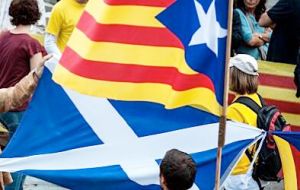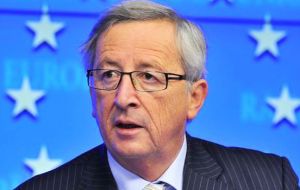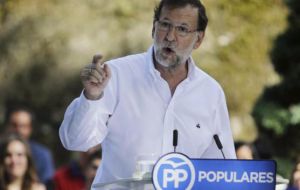MercoPress. South Atlantic News Agency
A homage, ‘Keep calm and carry on’
 Traditionally a portent of historic things to come, the fact that the eclipsed moon bore a striking resemblance to the colors in the Catalan flag made it all the more powerfully symbolic. At any rat
Traditionally a portent of historic things to come, the fact that the eclipsed moon bore a striking resemblance to the colors in the Catalan flag made it all the more powerfully symbolic. At any rat  Catalonia, like Scotland, has a per capita GDP that is higher than the EU average
Catalonia, like Scotland, has a per capita GDP that is higher than the EU average  Spanish translation of President Jean-Claude Juncker’s parliamentary text answer on Catalonia, differed markedly from the original English version.
Spanish translation of President Jean-Claude Juncker’s parliamentary text answer on Catalonia, differed markedly from the original English version.  Only the now ironically named, Popular Party of Catalonia of PM Rajoy, falling to a humiliating 8%, is fully against any constitutional progress for Catalonia.
Only the now ironically named, Popular Party of Catalonia of PM Rajoy, falling to a humiliating 8%, is fully against any constitutional progress for Catalonia. By Alex Salmond (*) - I do not know if Artur Mas, the president of Catalonia, deliberately chose the eclipse of the super-moon as the day on which to hold the most important election in Catalonia’s democratic history.
Traditionally a portent of historic things to come, the fact that the eclipsed moon bore a striking resemblance to the colors in the Catalan flag made it all the more powerfully symbolic.
At any rate, Catalonia did not disappoint with its historic vote, delivering a clear majority for the independence coalition of Junts pel Sí (Together for Yes) alliance and their allies in the radical left CUP. Although Madrid will point to the failure of the independistas to win a majority of the popular vote, that is a poor argument against change. Indeed, the left-green alliance of Catalunya Sí que es Pot (Catalonia Yes We Can), with a further nine percent of the vote, also supports the right of Catalonia to hold a referendum on independence.
Only the now ironically named, Popular Party of Catalonia of Prime Minister Mariano Rajoy, falling to a humiliating eight percent of the vote, is fully against any constitutional progress for Catalonia. With Spanish elections due in December, and looking problematic for the ruling party in Madrid, this is a very narrow political base on which to continue adamant opposition.
How should people react to this outpouring of democratic expression in Catalonia, first in the international community and the European Union, second, elsewhere in Spain, and third in Catalonia itself?
The international community should cease viewing Catalonia as a problem and start to see the opportunity in this democratic expression. In a world where violence abounds, and in a country that only two generations ago was ruled by a fascist dictator, peaceful democratic movements should be accorded respect and legitimacy. International commentators, whether sympathetic like myself or hostile like David Cameron, should support the right of the people to choose their own future; the interventions of President Obama, David Cameron and the European Commission in Spain are likely to stoke resentment.
There is nothing unreasonable in the idea that Catalonia could be successful as an independent country. Catalonia, like Scotland, has a per capita GDP that is higher than the European Union average. Were there an agreed, democratic and peaceful process of self-determination in Catalonia, Europe would have to acknowledge and accept that. All of this is merely to say that Europe must uphold its own key founding principles; turning its collective back on democracy is the sort of bureaucratic politics of convenience that further undermines the European ideal.
The Commission is already embroiled in controversy over allegations of interference in the Catalan vote. The Commission is looking into what happened to the Spanish translation of the text of the President Jean-Claude Juncker’s parliamentary answer on Catalonia, which differed markedly from the original English version. He was asked whether or not the Commission would recognize a unilateral declaration of independence from Catalonia, or whether it would honor the Spanish constitution, which is against a declaration. The English version was short and rightly insisted that it’s not the Commission’s place to “express a position on questions of internal organization related to the constitutional arrangements of a particular Member State.” The Spanish version was longer, and adds the view that a decision of a regional parliament cannot determine the territory of a member state.
The very last thing pro-Europeans across the continent need is the European Commission to descend into disrepute amid allegations that it has tried to interfere in so important a debate about the future of one of its member nations.
(*) Alex Salmond is a Scottish politician who served as the fourth First Minister of Scotland from 2007 to 2014. He is currently a member of both the Scottish and United Kingdom parliaments Politically, Salmond is one of the foremost proponents of Scottish independence.




Top Comments
Disclaimer & comment rules-

-

-

Read all commentsThere is only one word for this pompous prat - IDIOT!
Oct 01st, 2015 - 03:47 pm 0Alex Salmond - Shut it, you utter twat!
Oct 01st, 2015 - 03:59 pm 0Ignore the ignorance from the name callers Mr Salmond, continue your good work.
Oct 01st, 2015 - 05:45 pm 0Commenting for this story is now closed.
If you have a Facebook account, become a fan and comment on our Facebook Page!